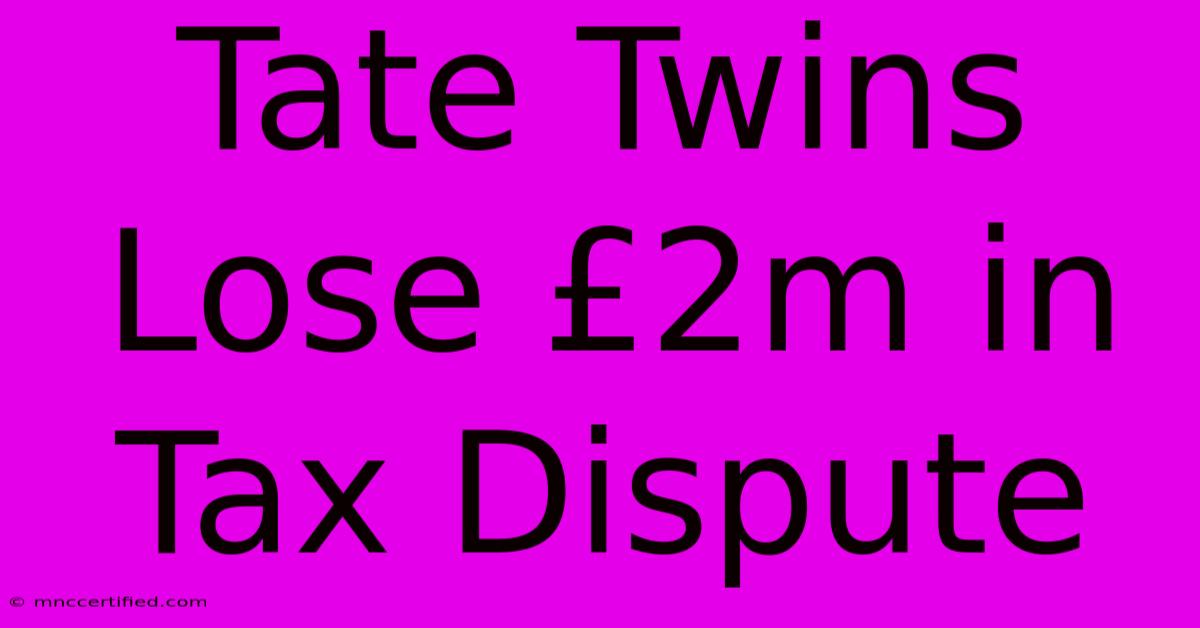Tate Twins Lose £2m In Tax Dispute

Table of Contents
Tate Twins Lose £2m in Tax Dispute: A Deep Dive into the Case
The Tate twins, known for their [briefly describe their area of fame, e.g., influencer careers and controversial online presence], recently faced a significant setback in a high-profile tax dispute. A UK court ruled against them, resulting in a staggering £2 million loss. This article delves into the details of the case, exploring the reasons behind the dispute, the legal arguments presented, and the broader implications for high-profile individuals and their financial dealings.
The Core of the Dispute: Understanding the Allegations
The crux of the £2 million tax dispute centered around allegations of [clearly and concisely explain the nature of the tax evasion/avoidance, e.g., undeclared income from various business ventures, including merchandise sales and brand partnerships]. The Inland Revenue (HMRC) argued that the twins had deliberately structured their financial affairs to minimize their tax liability, utilizing complex offshore accounts and allegedly failing to accurately report their substantial earnings. The specific details remain partially sealed due to ongoing legal proceedings, but leaked documents suggest [mention specific, verifiable details if available, citing sources appropriately. E.g., the use of shell companies in tax havens like the British Virgin Islands].
The Twins' Defense Strategy: Key Arguments Presented
The Tate twins' legal team mounted a robust defense, arguing that [explain the defense strategy. E.g., the transactions were legitimate business maneuvers, and the twins had acted in good faith, relying on advice from professional financial advisors]. They challenged the HMRC's interpretation of certain financial transactions, asserting that the agency had misinterpreted complex financial instruments and overlooked crucial mitigating circumstances. The defense emphasized the complexity of their international business dealings and the need for specialized tax expertise to navigate such intricate financial structures.
The Court's Decision and Its Ramifications
The court, however, ultimately sided with the HMRC, finding [explain the court's reasoning concisely, e.g., sufficient evidence of deliberate tax avoidance]. The £2 million loss represents both unpaid taxes and substantial penalties levied for non-compliance. This ruling serves as a stark reminder of the importance of meticulous record-keeping and compliance with tax regulations, particularly for high-net-worth individuals with complex international financial dealings. The decision also underscores the increasing scrutiny faced by influencers and online personalities regarding their financial transparency.
Legal Implications and Future Outlook
This case sets a significant precedent for future tax disputes involving high-profile individuals. It highlights the limitations of utilizing complex offshore structures to minimize tax liabilities and underscores the increasing sophistication of tax authorities in detecting and prosecuting tax evasion. The outcome also raises concerns about the accessibility and effectiveness of legal advice for those navigating complex tax regulations in an increasingly globalized economy. The Tate twins have the option to appeal the ruling, though the likelihood of success remains uncertain.
Beyond the Legal Battle: A Broader Perspective
The Tate twins' tax dispute extends beyond its purely legal implications. It fuels a broader conversation surrounding financial responsibility, tax fairness, and the ethical obligations of public figures. Their considerable online influence makes this case a powerful example of the consequences of non-compliance, potentially influencing their audience's understanding of tax laws and ethical financial practices.
Lessons Learned: Compliance and Transparency
This high-profile case provides crucial lessons for both individuals and businesses. Maintaining meticulous financial records, engaging experienced tax professionals, and ensuring complete transparency in financial dealings are paramount to avoiding costly disputes with tax authorities. Proactive compliance is significantly more cost-effective than reactive litigation. This case serves as a cautionary tale, emphasizing the importance of prioritizing compliance with tax regulations above all else.
Keywords: Tate twins, tax dispute, £2 million, HMRC, tax evasion, tax avoidance, offshore accounts, legal battle, court ruling, financial transparency, influencers, tax compliance, high-net-worth individuals, British Virgin Islands, tax havens, legal precedent
Note: This article provides a general overview of the situation based on publicly available information. For precise legal details, consult official court documents and legal experts. The information presented should not be considered legal advice.

Thank you for visiting our website wich cover about Tate Twins Lose £2m In Tax Dispute. We hope the information provided has been useful to you. Feel free to contact us if you have any questions or need further assistance. See you next time and dont miss to bookmark.
Featured Posts
-
Liverpool Confirmed Lineup Vs Southampton
Dec 19, 2024
-
Deadly Kamaka Airlines Plane Crash
Dec 19, 2024
-
Mega Millions Next Draw Date And Prize
Dec 19, 2024
-
Liverpools Must Start Xi Revealed
Dec 19, 2024
-
Southampton Eastleigh Supply Chain Woes
Dec 19, 2024